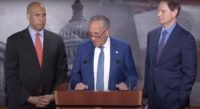After practically a decade of dialog and training on the Hill, the Senate Banking, Housing and City Affairs Committee lastly held a markup on the Safe and Truthful Regulation (SAFER) Banking Act. Beforehand often called the SAFE Banking Act, the “R” was included to account for Sen. Jack Reed’s (D-RI) considerations with Part 10. The senator shared his considerations publicly on Might 11 throughout the “Analyzing Hashish Banking Challenges of Small Companies and Staff” listening to. Sen. Reed mentioned that Part 10’s language “would make it harder for federal regulators to boost the alarm about relationships with any buyer that presents important dangers to the financial institution” and shared that such a provision is “not restricted to the marijuana business or the hashish business,” however that it “may enable pyramid schemes or all kinds of different fascinating exercise to go on with out an efficient response by the regulator.” Since then, he and a bunch of bipartisan members, together with Majority Chief Chuck Schumer (D-NY), Senate Banking Committee Chair Sherrod Brown (D-OH), and Sens. Steve Daines (R-MT), Cynthia Lummis (R-WY), Kevin Cramer (R-ND) and Kyrsten Sinema (I-AZ), have labored endlessly to develop language to resolve such considerations whereas sustaining GOP help, resulting in the SAFER Banking Act.

Hashish-Associated Companies in the USA
(Reported in SARS)
The distinction between the SAFE Banking Act and the SAFER Banking Act can primarily be present in Part 10. Adjustments concentrate on and determines:
- How regulators terminate financial institution accounts;
- How the Federal Deposit Insurance coverage Company (FDIC) develops steering for monetary establishments serving state-licensed hashish companies;
- How revenue derived from state-legal hashish enterprise exercise is managed;
- That non-public and political opinions can not affect a monetary regulator’s determination making;
- That federal banking regulators and state banking supervisors and their secretaries of Commerce and Treasury would create guidelines to extend entry to deposit accounts and the way such people would improve buyer relationships with rural, low- and moderate-income, unbanked and tribal communities; and
- How the FDIC would conduct a biennial survey and report on boundaries for small- and medium-sized companies.
Throughout the markup on Wednesday, members launched and mentioned a spread of amendments associated to legal justice reform, the racial wealth hole, federal regulators and their processes, rescheduling and the opioid epidemic. In complete, there have been six amendments, one by Chairman Brown, in addition to Sens. Mike Crapo (R-ID), Invoice Hagerty (R-TN), Mike Rounds (R-SD) and two by Sen. Raphael Warnock (D-GA). Sen. Brown’s modification, which might make technical modifications to the invoice, was the one modification to prevail on a 17-6 vote.

To start the markup, Chair Brown mentioned that propelling this laws is a vital step in reversing the injury executed by the warfare on medication and clarified that the SAFER Banking Act would create a greater monetary system for small and medium-sized hashish companies that lack entry to such conventional banking companies. Sen. Daines, who served because the committee rating member rather than Sen. Tim Scott (R-SC), who was in California getting ready for the Republican presidential debate, shared that though he opposes legalization or decriminalization, he agreed to sponsor and help the SAFER Banking Act as a result of it will repair the present banking system for hashish companies nationwide. After listening to remarks from Sens. Lummis, Catherine Cortez Masto (D-NV) and Sinema, the committee voted on the invoice, and authorized its passage to the Senate flooring on a 14-9 vote. Senators voting in favor of the invoice have been Brown, Tester, Warren, Reed, Menendez (by proxy), Smith (by proxy), Warner, Fetterman, Cortez-Masto, Sinema, Van Hollen, Lummis, Cramer and Daines, and voting towards the measure have been Sens. Warnock, Scott (by proxy), Crapo, Tillis, Kennedy, Haggerty, Vance and Britt.
After the vote, Sen. Jeff Merkley (D-OR) thanked Sen. Rand Paul (R-KY) and former Republican Sen. Cory Gardner (CO) for his or her early efforts and for bringing the laws and difficulty to the chamber’s consideration and concluded that he hopes to have a sturdy dialogue with the complete Senate chamber.
With the invoice out of committee, it heads to the Senate flooring for added enter, dialogue and probably a vote. Majority Chief Schumer has mentioned he intends to convey the SAFER Banking Act to the ground “with all due pace” and famous that he’s dedicated to attaching Rep. Dave Joyce’s (R-OH) Harnessing Alternatives by Pursuing Expungement (HOPE) Act and Rep. Brian Mast’s (R-FL) Gun Rights and Marijuana (GRAM) Act to the ultimate laws. Sen. Schumer additionally shared that such provisions would handle the warfare on medication, bolster social fairness and legal justice reform and defend Second Modification rights for medical hashish sufferers.
When the SAFER Banking Act will obtain flooring time stays unclear, however Chief Schumer has made quite a few representations that he want to see it executed this yr.
Supply hyperlink
#Making #Hashish #Trade #SAFER #America